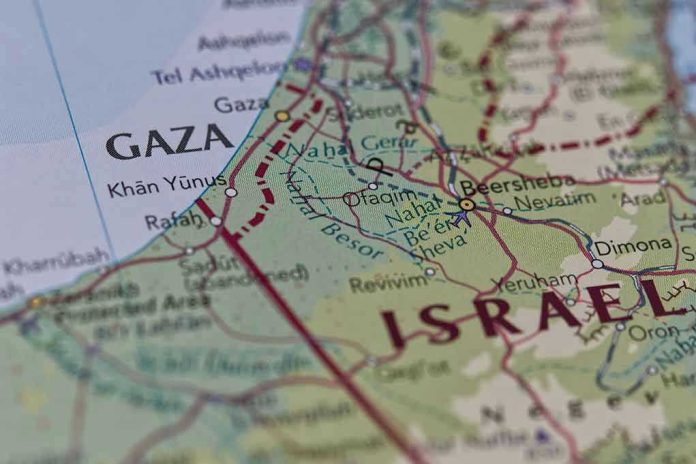
Hamas’s unprecedented plea to President Trump to broker a 60-day ceasefire in exchange for hostage releases places American leadership, constitutional principles, and national security directly in the crosshairs amid global diplomatic chaos.
Story Snapshot
- Hamas bypasses current U.S. officials, appealing directly to Trump to secure a deal for hostages in Gaza.
- Proposal offers release of half of remaining hostages for a Trump-guaranteed truce, with fewer than half believed alive.
- Qatar holds the letter and mediates, highlighting shifting international alliances and weakened U.S. diplomatic channels.
- Rising recognition of Palestinian statehood by Western powers increases pressure on Israel and challenges traditional U.S. positions.
Hamas Bypasses Biden Administration to Seek Trump’s Intervention
Hamas drafted a letter addressed to President Donald Trump, asking him to guarantee a 60-day ceasefire in the ongoing Israel-Gaza conflict in exchange for the release of half the hostages held in Gaza. This direct appeal bypasses the sitting U.S. administration, signaling a loss of faith in conventional channels and leveraging Trump’s reputation as a skilled negotiator rooted in American strength and deal-making. The letter is currently with Qatari intermediaries and is expected to reach Trump during the high-stakes United Nations General Assembly in New York. Such a move highlights the shifting power dynamics in international diplomacy and raises urgent questions about American sovereignty, transparency, and the effectiveness of constitutional government in protecting national interests.
Hostages as Bargaining Chips: Humanitarian Crisis and Geopolitical Leverage
With approximately 48 hostages remaining—less than half believed to be alive—Hamas’s proposal underscores the humanitarian catastrophe resulting from years of failed ceasefire negotiations and escalating violence since October 7, 2023. Qatar’s critical role as mediator has increased following Israeli military strikes in Doha, further stalling diplomatic talks and amplifying the urgency for a resolution. The use of hostages as leverage by militant groups is not new, but this latest episode sets a dangerous precedent by involving a U.S. president in direct negotiation, a sharp departure from established protocols and a potential challenge to the separation of powers and traditional diplomatic processes.
Global Pressure and the Erosion of Conservative Values
International recognition of Palestinian statehood by countries such as the United Kingdom, Canada, Portugal, and Australia intensifies diplomatic pressure on Israel and threatens to undermine longstanding American support for its ally. Israeli Prime Minister Netanyahu’s condemnation of these moves as “rewarding terrorism” echoes concerns held by many conservatives about the erosion of core principles: national sovereignty, security, and the defense of Western democratic values. Amid stalled negotiations and mounting casualties, calls for a two-state solution and humanitarian aid are rising, all while constitutional checks and balances appear increasingly vulnerable to globalist agendas and non-state actors seeking legitimacy at America’s expense.
Trump’s Response and Implications for U.S. Policy
President Trump, attending the UN General Assembly, has issued a stern “last warning” to Hamas demanding the unconditional return of hostages. Negotiations remain stalled, with hopes that Trump’s involvement could revive talks and restore America’s reputation for decisive leadership. However, experts caution that involving the president risks complicating official U.S. diplomatic efforts and may inadvertently set a precedent for future negotiations involving non-state actors. For conservatives, this development is a stark reminder of the importance of constitutional order, strong American leadership, and the dangers posed by weakened borders and government overreach in the face of mounting international pressures.
@realDonaldTrump NO! STAND BY YOUR WARNING!!
Hamas letter to Trump asks for 60-day ceasefire deal to release half of hostages, sources say https://t.co/KkV9HYvZlA #FoxNews— Cindy Smith (@Smith150213) September 22, 2025
Complex Risks: Precedents, Power, and Constitutional Integrity
The direct appeal to Trump exemplifies a broader trend of eroding traditional diplomatic channels and centralizing power outside constitutional norms. Industry analysts highlight Hamas’s tactical desperation and Qatar’s pivotal mediation as symptoms of a fractured global order. The possibility of a 60-day ceasefire offers short-term humanitarian relief but carries significant long-term risks, including the normalization of negotiating with militant groups and potential challenges to American constitutional values and the rule of law. As the situation develops, vigilance is required to safeguard conservative principles, protect national interests, and prevent further erosion of America’s global standing.
Sources:
Hamas Writes to Trump, Proposes 60-Day Ceasefire for Hostages
Hamas to tell Donald Trump it’s open to ceasefire/hostage deal
Hamas tells Trump it will trade 60-day truce for hostages



